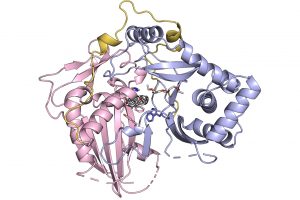Elixirs of Nature: Exploring the Plant Kingdom for New Medicines
Jing-Ke Weng recently spoke with Dustin Grinnell on his podcast series ‘Curiously’ about his research on plant natural products. Take a listen.
Jing-Ke Weng recently spoke with Dustin Grinnell on his podcast series ‘Curiously’ about his research on plant natural products. Take a listen.
Please register for the 2024 FASI Annual Symposium, focusing on ‘Understanding Body Defenses Against the Chemical Environment,’ scheduled for Friday, May 31, 2024. Jing-Ke Weng has been invited to discuss our research on the parallel evolution of chemical defense system expansion in plants and the enhanced ability of vertebrates to detect harmful compounds.
The FASI symposium unites hundreds of scientists and community members from various fields each year, all coming together to exchange information on their research. We believe food allergies are developed as a result of exaggerated defense responses to noxious substances that may have been inadvertently coupled with exposure of food allergens. The program will feature leaders in the field and provide an opportunity for collaboration with colleagues working on advancing the science of food allergy and beyond.

Jing-Ke Weng presented a talk on the Evolutionary Origin of Acutumine Biosynthesis in Menispermaceae Plants at Plant Biology 2023, and spoke with ASPB #PlantBio2023 conference correspondent Charlay Wood about the work after the talk. Here is the interview transcript.
We are excited to announce that Jing-Ke Weng has been appointed as a Professor of Chemistry and Chemical Biology in the College of Science, and of Bioengineering in the College of Engineering at Northeastern University, effective July 3, 2023. Our laboratory will complete its relocation to the new EXP building on Northeastern’s Boston campus later in 2023. Meanwhile, Jing-Ke Weng will assume the role as the Inaugural Director tasked with building the brand-new Institute for Plant-Human Interface (IPHI) from the ground up. The mission of IPHI is to deepen our understanding of plant biology and the plant-human interactions that significantly influence human health and sustainability on Earth. IPHI is committed to devising sustainable strategies that benefit both plants and humans, and to fostering the development of future scientists and engineers in this critical field.
What’s in traditional Chinese herbal medicine, and do its prescriptions work? Scientists are untangling the chemical secrets of ancient recipes. An article by Shi En Kim on C&EN featuring Weng Lab research.
Colin Kim et al. report the structural and mechanistic basis underlying how coumarin synthase (COSY), an enzyme that plants use to make agriculturally and medicinally important molecules called coumarins, does its job. See the press release here.

In the hunt for a food allergy cure, Food Allergy Science Initiative (FASI) researcher works to unlock the mystery of traditional medicine using modern science. Jing-Ke discusses his recent work at FASI.

Our work on sporopollenin structure, evolution, biosynthesis, and environmental degradation featured by Quanta Magazine. Read the full article here.
A pain-causing compound in the Australian stinging tree has applications for cancer treatment, but it’s difficult to harvest enough to study. Whitehead Institute scientists present a way to synthesize the compound in the leaves of harmless tobacco plants, and potentially in a culture dish. Read the news release here.

A Climate Grand Challenges flagship project aims to reduce agriculture-driven emissions while making food crop plants heartier and more nutritious. Read MIT news here.
